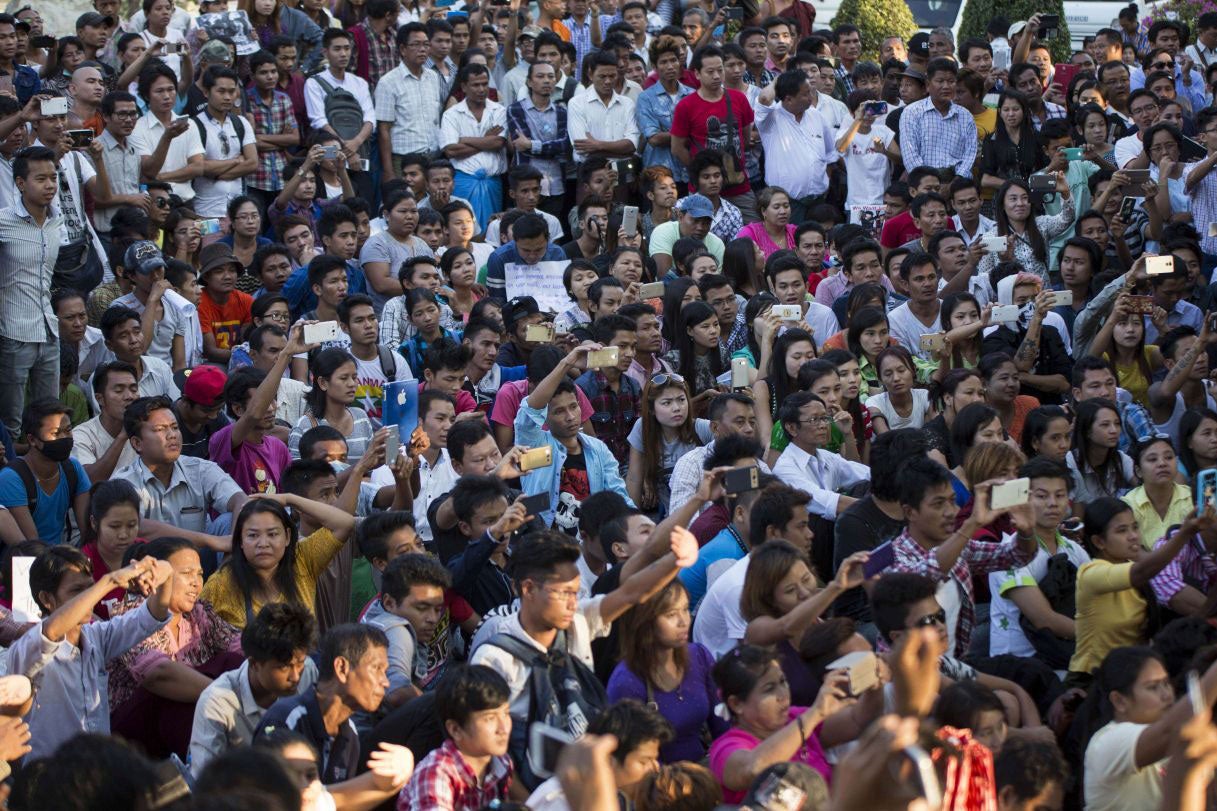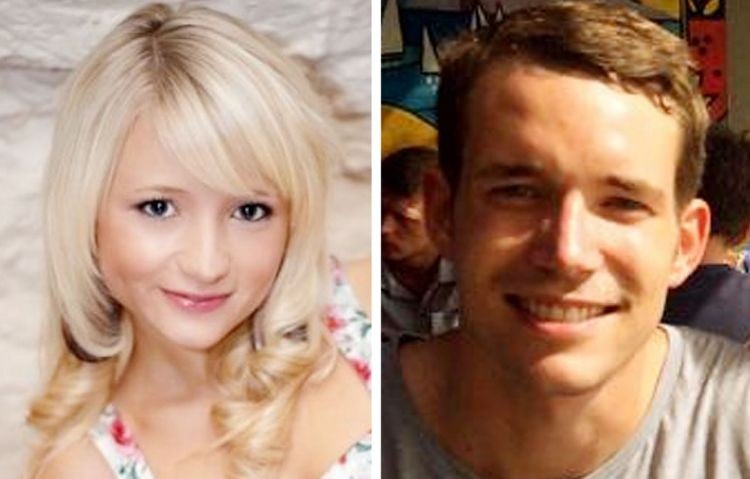Thailand backpacker murders: Burmese protesters call for investigation into killing of British pair
Thai police have been accused of torturing the two Burmese men convicted of the murders

Your support helps us to tell the story
Our mission is to deliver unbiased, fact-based reporting that holds power to account and exposes the truth.
Whether $5 or $50, every contribution counts.
Support us to deliver journalism without an agenda.

Louise Thomas
Editor
They met for the first time during what was supposed to be a relaxing holiday in Thailand, a chance for them both to catch up with friends away from their studies. But before Hannah Witheridge and David Miller could get to know each other properly, their lives were cut short in a brutal and senseless fashion, their battered bodies found on a beach on the island of Koh Tao.
On Christmas Eve, a Thai court convicted two Burmese bar workers of murdering the two British backpackers, sentencing them both to death. Zaw Lin and Wai Phyo, both aged 22, were also found guilty of raping Miss Witheridge, whose lifeless body was found lying near Mr Miller's on 15 September last year.
Speaking outside the courtroom, Mr Miller's family said the decision meant that justice had finally been done, describing the evidence against the two migrant workers as “absolutely overwhelming”. But there is increasing concern that the wrong men have been convicted, amid suggestions that the case was bungled by police who tortured them until they confessed.

On Friday around 1,000 protesters gathered in front of the Thai embassy in Rangoon, the largest city in Burma, shouting “we want justice” and demanding freedom for Lin and Phyo. Many believe that the men were easy scapegoats for Thailand's authorities due to their status as low paid migrant workers.
Around 2.5 million Burmese migrants work in the richer neighbouring country, many in the fishing and construction industries or as domestic helpers or cleaners in hotels and restaurants. During the murder trial, lawyers for Lin and Phyo said the extraction of their confessions was part of Thailand's “systematic abuse” of migrants.
The holes in the case
- The first police officers at the crime scene on Koh Tao did not have the correct training and failed to seal off the area correctly – resulting in tourists walking across the spot where the bodies were discovered and potentially contaminating valuable forensic evidence.
- Thailand's most well known forensic scientist, Dr Pornthip Rojanasunand, testified at the trial that the crime scene had been poorly managed and evidence improperly collected. His institute was not allowed any involvement in the investigation.
- At one stage police said they were treating Mr Miller's friend XXX as a possible suspect, before eliminating through DNA evidence. They also hinted they were looking at someone from a powerful family on Koh Tao – shortly before the police commander in charge of the investigation was abruptly transferred this line of inquiry was dropped.
- During the murder trial, the court heard that several CCTV cameras near the crime scene were not working. Other cameras close to a nearby pier were not inspected by police to see whether anyone had fled by boat after the crime.
- Both defendants initially confessed to the murders, but later retracted their statements saying they had been extracted through torture. No lawyers were present during the confessions and the translators were reported to be of dubious reliability.
The human rights group Amnesty International is also calling for an independent investigation to be held into the men's claims of mistreatment at the hands of Thai police. The families of the victims would not have “peace of mind” unless a retrial was held which respected international laws on torture, it claimed.
“The Thai police force has a long and disturbing track record of using torture and other forms of ill-treatment to extract 'confessions',” said Champa Patel, Amnesty's director for Southeast Asia and the Pacific. “This is far from an isolated case. The Thai authorities must start taking concrete steps to stamp out torture, not just paying lip service to doing so.”
Although the allegations of torture were dismissed by a judge during the case, the Thai National Human Rights Commission has concluded that the men's claims were credible. Lin and Phyo are set to appeal their convictions – a process which may take up to a year – and any retrial should disregard evidence extracted using violence, Amnesty added.
However, Mr Miller's family said they had followed the trial closely and had concluded that the two men were guilty, despite having initial misgivings. “They raped to satisfy their selfish desires and murdered to cover up that fact. They have shown no remorse during the trial,” said Mr Miller's brother Michael.
Miss Witheridge, 23, met Mr Miller, 24, on Koh Tao while they were staying in the same hotel with separate groups of friends. Both were killed in the early hours of the morning while on their way home from a night out, but the exact details of what happened to them are still confused – partly due to mistakes by police.
Post-mortem examinations showed that both suffered severe head wounds and that Miss Witheridge was raped before being killed, while Mr Miller may have died as a result of drowning after being dumped in shallow water on the beach. His family has suggested he may have been targeted after intervening when he witnessed Miss Witheridge being attacked.
Although prosecutors said DNA evidence collected from cigarette butts, a condom and the bodies of the victims linked Lin and Phyo to the killings, their lawyers said DNA samples from the alleged murder weapon – a garden hoe – did not match. The first police officers to attend the crime scene were also said to have been poorly trained, resulting in the area not being properly sealed off and allowing for the possible contamination of evidence.
However, after the men were convicted Mr Miller's family insisted that the police investigation was “not the so-called shambles it was made out to be”. While it was “easy to conclude” that Lin and Phyo were convenient scapegoats for the murders, officers had actually carried out “methodical and thorough” work to construct a powerful case against them, they added.
Legal campaigners following the case have also criticised the role of the British government, which sent a team from Scotland Yard to review the Thai police investigation but then refused to share the results with the defendants' legal team. It has been suggested that this refusal may have indirectly resulted in the death penalties being handed down.
Subscribe to Independent Premium to bookmark this article
Want to bookmark your favourite articles and stories to read or reference later? Start your Independent Premium subscription today.
Join our commenting forum
Join thought-provoking conversations, follow other Independent readers and see their replies
Comments